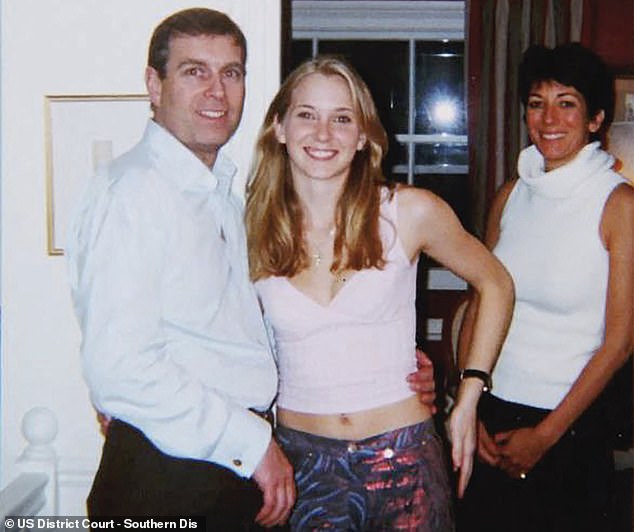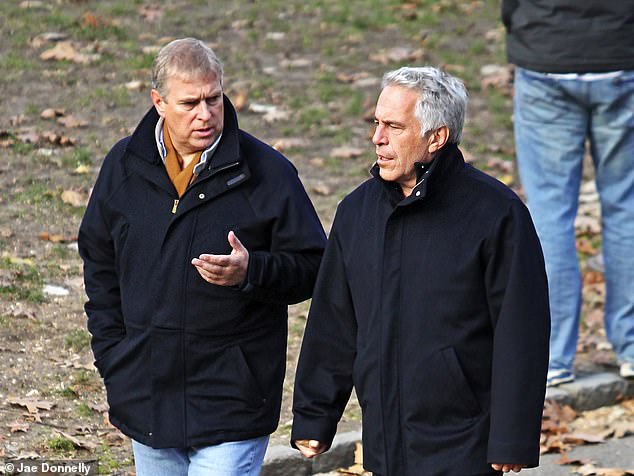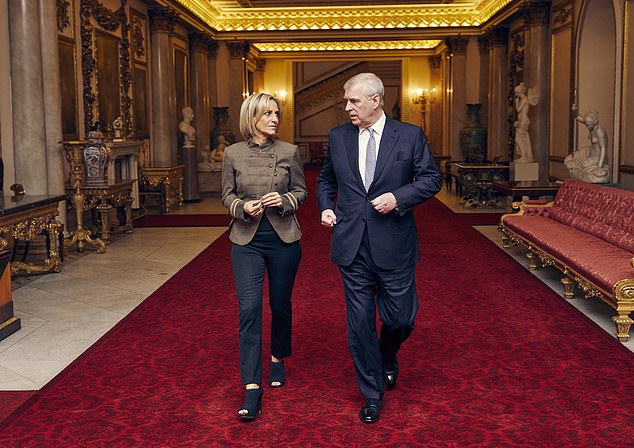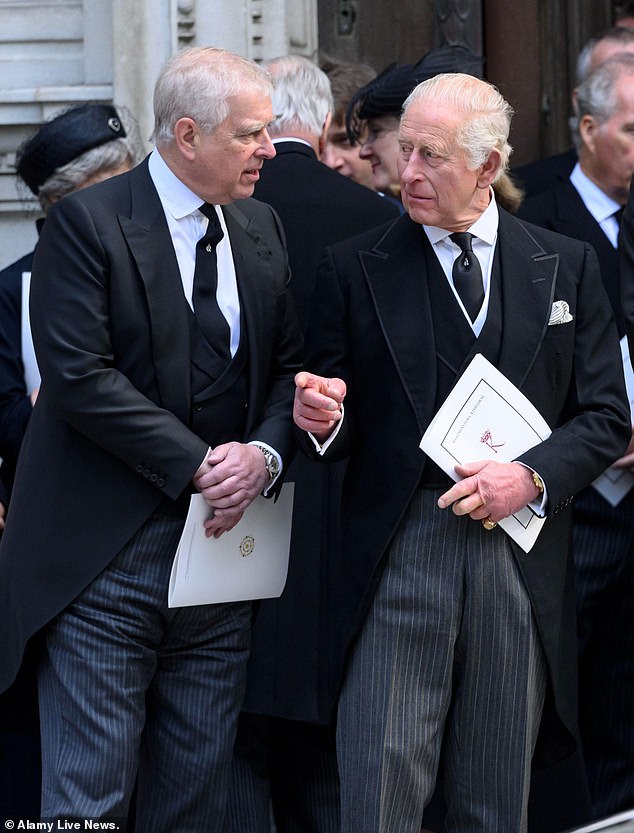Another day, another damning email – and Prince Andrew’s reputation, such as it is, receives a further grievous blow.
It is not just the Mail on Sunday’s revelation that he remained in contact with sex offender Jeffrey Epstein much longer than he previously claimed that is so damning. Equally incriminating is the fact he was misleading when asked about it. In short, that he lied.
After months of disclosures about Andrew and his links with Epstein’s unsavoury world, this apparent dishonesty plumbs new depths. The bombshell email casts significant doubt on the version of events he offered in his BBC Newsnight interview with Emily Maitlis.
Back then, he claimed he had cut off all ties with the disgraced billionaire after meeting him in New York in December 2010. Now we know they were still in touch some 12 weeks later. At the same time, the affectionate tone of the message – ‘We are in this together’ – is also devastating as it destroys claims that the two were never close.
The date of the email is also highly relevant. It was sent on February 28, 2011, the day after the MoS had published for the first time the notorious photograph of Andrew with his arm around the bare midriff of Virginia Giuffre.
This, remember, was a picture that Andrew later claimed was a crude fake, suggesting the hand around her waist was not his. Yet, incredibly, he makes no mention of this is the email.

The day after the MoS published for the first time a photograph of Prince Andrew with his arm around Virgina GIuffre, he sent an email to Jeffrey Epstein saying ‘we are in this together’

Andrew claimed he had cut ties with Epstein after they met in New York in December 2010 (pictured)
Even the BBC, normally restrained in its royal coverage, reported yesterday that the allegations were ‘intensely damaging’ for the prince. But perhaps still more significant are the consequences of this never-ending saga on the image of the monarchy.
Every good deed, such as Prince William’s Earthshot Prize, the Queen’s literacy initiative and Princess of Wales’s early years campaign, risks being drowned out by the relentless wave of the Andrew scandal.
It corrodes public support for the royals and emboldens republican voices which gleefully seize on every indiscretion to scorn the House of Windsor’s credibility.
As more and more emerges, the clamour for action from a public that wants some kind of sanction – anything – against Andrew intensifies. Stripping him of his remaining title as Duke of York has regularly found favour. A YouGov poll in the summer showed 67 per cent of people supporting the idea, but it would require the intervention of parliament.
Yet inside the Palace there is reluctance. Aides caution that removing the York honorific would still leave him a prince, a title many see as superior to that of a mere duke.
Then there’s talk of sacking Andrew from the Order of the Garter, this country’s highest chivalric honour. It’s a possibility, though Andrew has himself reduced his presence as a Knight of the Garter by no longer attending public displays of the Order.
For Charles, who is painfully aware of the public pressure, the predicament is intense. It is not just the brotherly ties of affection and his dislike of confrontation but also the knowledge that the baubles remaining to Andrew – dukedom and Garter – were granted by their late mother.

The bombshell email casts significant doubt on the version of events Andrew offered in his BBC Newsnight interview with Emily Maitlis

For Charles the predicament is intense. It is not just the brotherly ties of affection and his dislike of confrontation but also the knowledge that the baubles remaining to Andrew – dukedom and Garter – were granted by their late mother
It is this, friends say, which makes removing them all the more difficult. Charles is by no means the only royal who has observed the mantra that if you don’t know what to do about a situation, do nothing.
But while the late Queen Elizabeth was said to frequently follow that maxim, history suggests she often did otherwise.
When howls of protest greeted the news that taxpayers would meet the cost of rebuilding Windsor Castle after the 1992 fire, she stepped in and said she would pay herself. Similarly, when public anger threatened to boil over in the absence of official recognition following the death of Princess Diana, she overturned stiff royal protocol to allow a flag to fly at half mast above Buckingham Palace.
It was the Queen who, in 2021, flatly refused to allow her grandson Prince Harry’s ‘half-in, half-out’ royal life. But never was her uncanny ability to divine the public mood more prescient than when she first confronted Andrew over the fall-out following the Newsnight broadcast, ruthlessly taking away his military positions, banning him from public engagements and depriving him of using the HRH style.
All these actions were taken to defend the Crown and the good name of the monarchy, and in each case cause and effect had to be measured. But with the prospect of weeks if not months of more revelations dripping into the public gaze, surely the time for action has again been reached.
So what can the King do? One idea taking root among royal insiders is that Andrew could be prevented from enjoying certain princely privileges. I understand this includes his use of the royal estates at Balmoral, Sandringham and Windsor for weekend shooting parties. (He famously referred to one such shoot – attended by Epstein and his then girlfriend Ghislaine Maxwell – in the Newsnight interview.)
One figure told me: ‘It might help concentrate his mind if things he has taken for granted for a very long time, such as shooting with his mates and having the run of a royal home, were suddenly not available.’
The heart of the Andrew conundrum, however, remains Royal Lodge, the Windsor mansion where he is holed up. But while public criticism surrounding his continued occupation of a property is undiminished, the prince has a cast iron lease with the Crown Estate, which run until 2078.
All attempts at dislodging him have failed. And as long as he can meet the huge cost of the upkeep, there is little even the King can do. There is, of course, the counter argument, that it may be better for him to stay at Royal Lodge where he will be less trouble than if moved elsewhere. Far from being the solution, casting him into some kind of exile beyond even the reach of the King may represent a greater risk.